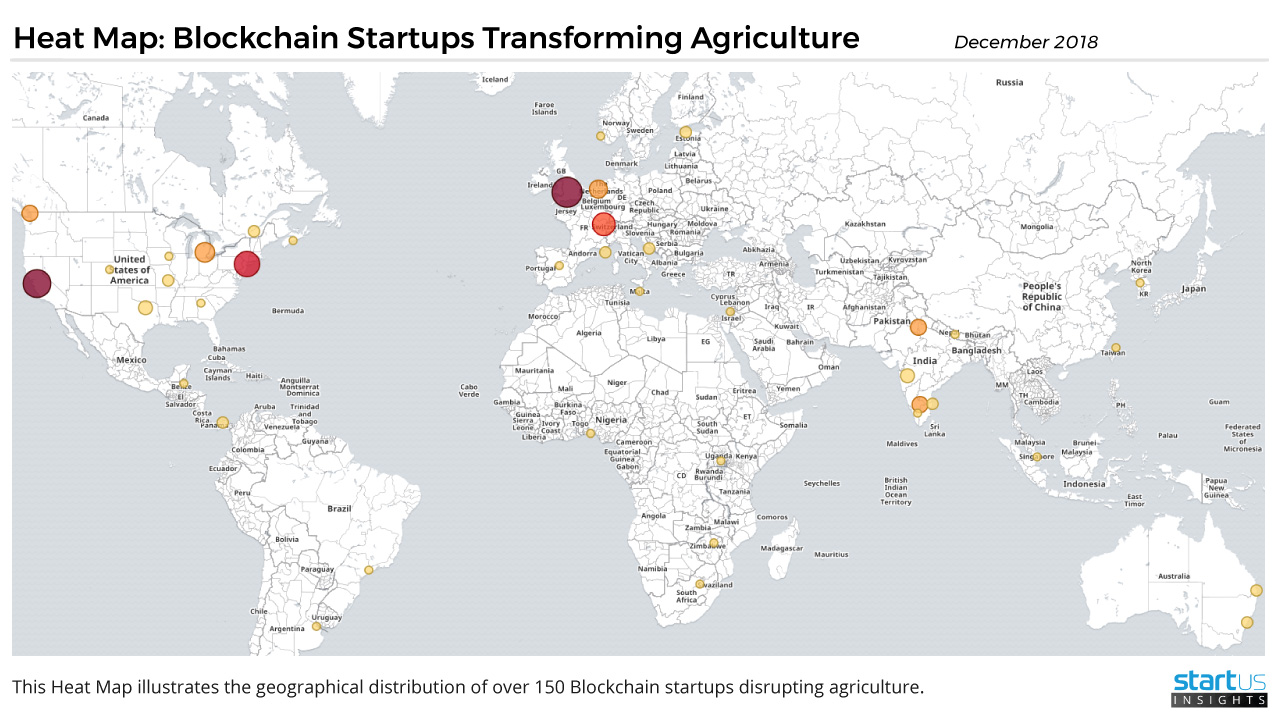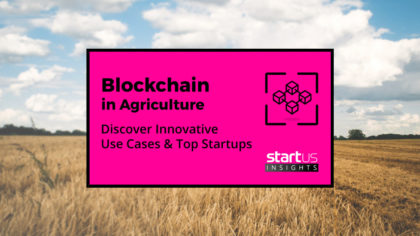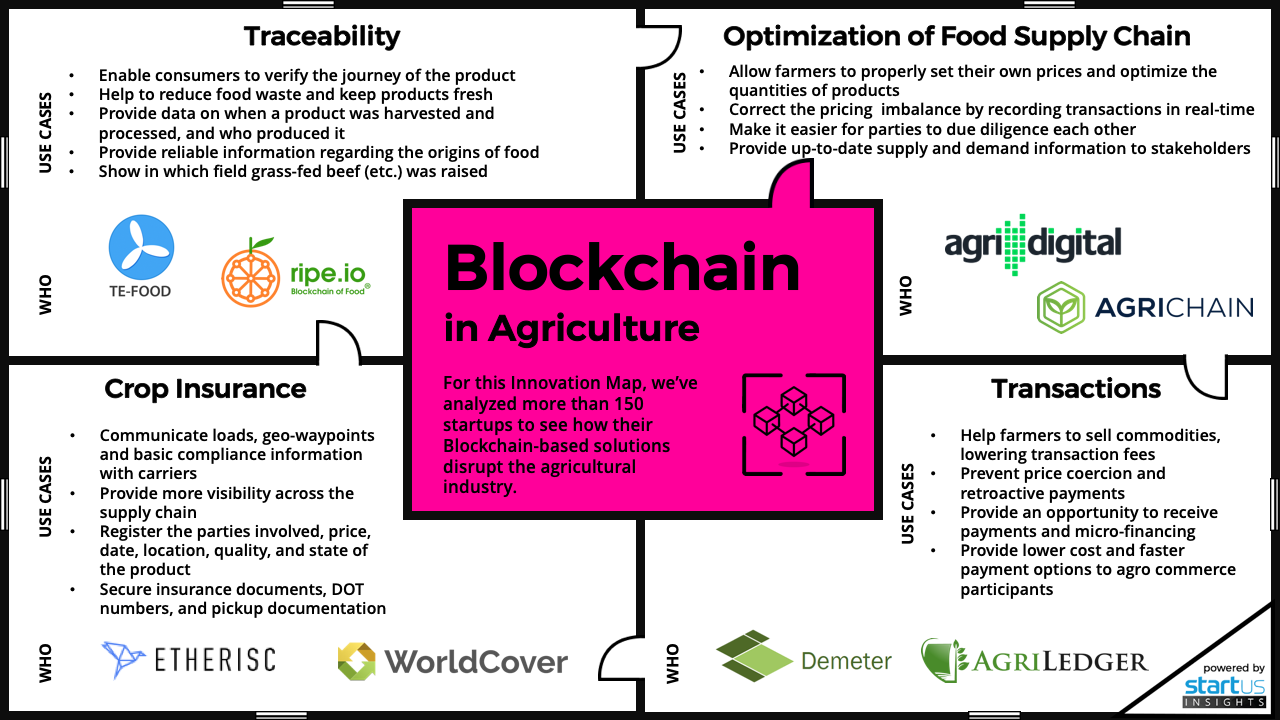Key Takeaways
Blockchain technology improves the following areas within the agricultural sector:
- Optimization of the Food Supply Chain – Reducing the time of food origin tracing to a matter of seconds — ensuring safety and improving efficiency.
- Crop Insurance – Communicates loads, geo way-points and basic compliance information with carriers and registers the quality of the product, its price, location, and parties involved.
- Transaction – Helps farmers to sell commodities at fair prices and lowering transaction fees thereby supporting smaller farmers to enter the market.
- Traceability – Smart contracts insure a farmer’s crops and claim damages thus replacing old and burdensome insurance processes, which could take up to months.
Heat Map: Blockchain Startups Disrupting The Agricultural Industry
The insights of this data-driven analysis are derived from the Big Data & Artificial Intelligence-powered StartUs Insights Discovery Platform, covering 2.093.000+ startups & scaleups globally. The platform gives you an exhaustive overview of emerging technologies & relevant startups within a specific field in just a few clicks.
The Global Startup Heat Map below reveals the distribution of exemplary startups & scaleups we analyzed for this research. For custom insights, get in touch.

Click to enlarge
Global Distribution of Blockchain Startups Transforming the Agriculture Sector (c) StartUs Insights
8 Blockchain Startups Transforming The Agricultural Industry:
- AgriChain – A blockchain company focusing on enabling peer-to-peer agricultural transactions and processing while cutting out the middlemen.
- AgriDigital – A blockchain-based and integrated commodity management solution for the global grains industry. The platform helps to process complex agricultural transactions through smart contracts.
- AgriLedger – A UK social enterprise project supporting farmers in tracing food origins, getting easier access to financing, and storing transactions data.
- Demeter – A central hub to rent and farm micro fields anywhere in the world – with no middlemen, complexity or the overhead of a big organization.
- Etherisc – A blockchain startup offering crop insurance to farmers via its decentralized insurance applications.
- Ripe – By designing a transparent digital food supply chain, the startup harnesses quality food data to create the Blockchain of Food – mapping the food journey.
- TE-FOOD – Applies identification tools to livestock, transports, and fresh food packages to follow the items throughout the whole supply chain.
- Worldcovr – Provide crop insurance to protect against loss of yield using satellites to monitor the rainfall and trigger payouts automatically.
The size of blockchain innovations in the agriculture market is expected to grow from an estimated $41.2 million in 2017 to nearly $430 million by 2023, representing an impressive 47.8% compound annual growth rate (CAGR).
The blockchain is already reshaping the industry’s way of doing business by decreasing the risk of fraudulent activities, boosting transaction speeds, helping farmers control and analyze crops, and much more.
Innovation Map: How Blockchain Transforms The Agricultural Sector
Our team of innovation analysts conducted thorough and extensive research on the potential of blockchain in the agricultural industry, encompassing over 150 startups working in the field.
Below, you’ll find the Innovation Map highlighting the most promising application areas as well as a deep dive in each of the sections.
Optimization of the Food Supply Chain
Providing information on the origins of food products is essential to ensure customer loyalty and confidence. Blockchain can essentially make any fruit or vegetable as safe to buy as the ones grown locally from a nearby farm.
With traditional supply chains, food retailers do not have an effective way of ensuring that all products were grown under conditions specified by a given supplier. That’s why retail giants such as Walmart, Unilever, and Carrefour already resort to blockchain for tracing food products’ places of origin.
Moreover, the time it takes to track the origin of food is also massively cut down. Taking Walmart as an example, it took nearly a week to trace the origin of their mangoes. Through the blockchain, this time is cut to a mere 2 seconds.
In case a product is not up to a retailer’s standards, limiting the time it takes to trace a product’s source is crucial as it empowers retailers to isolate this product more quickly thus minimizing the risk of harm to humans.
Transactions
Blockchain in agriculture is uniquely positioned to help not only simplify transaction processes but also to level the playing ground for small-scale farmers and crop growers, especially from poor regions.
It is estimated that $940 billion worth of food goes to waste every year worldwide. In part, this happens because farmers and growers from less developed countries do not always have access to wide markets, which leaves them incapable of selling all the food they produce.
AgUnity is one blockchain startups tackling this issue by giving small players access to their proprietary blockchain-based platform for trading agricultural products and building trust between market participants. Their product allows individual market participants to form small co-operatives and work together.
Another benefit blockchain brings to the table is the ability for agricultural producers to set prices more efficiently and effectively. This allows managing their output to match the demand for their products.
Crop Insurance
In agriculture, smart contracts have unique implementations in the form of helping farmers insure their crops and claim damages with insurance companies. Normally, it is a painfully slow and burdensome process, both on the side of the grower and the company that insures them.
Unpredictable weather anomalies make it difficult to correctly estimate and quickly report the exact losses they cause. This leaves room for fraud and makes the process an operational nightmare.
Through setting up tailored smart blockchain contracts, the damage claim can be triggered via changes to weather conditions that meet certain criteria, easing the process for farmers and insurers.
Traceability
Demand for organic, local products is constantly rising. Blockchain enables consumers to verify the journey of their product, tracing it from farm to table.
Moreover, it also provides data on when a product was harvested and produces as well as who produced it. This goes as far as to tell show consumers in which field their grass-fed beef, amongst other products, was raised – in a matter of seconds.
As the information recorded on the blockchain is unalterable, it can provide reliable information and is forgery-proof.
Discover more AgriTech Startups
AgriTech startups such as the examples highlighted in this report focus on precision farming, crop health as well as irrigation systems. While all of these technologies play a major role in advancing the agricultural industry, they only represent the tip of the iceberg. To explore more agricultural technologies, simply get in touch to let us look into your areas of interest. For a more general overview, you can download our free AgriTech Innovation Report to save your time and improve strategic decision-making.









